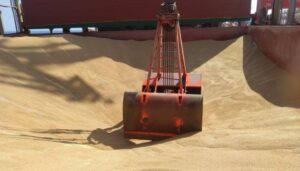
The ban on the export of wheat, barley, rapeseed and sunflower seeds from Ukraine to Poland, Hungary, Slovakia, Romania and Bulgaria, imposed on May 2 for the period until June 5, will be extended until September 15, the Polish Minister of Agriculture and Rural Development Robert Telusz said.
“It (the relevant regulation) has not yet been approved or published, but we have information that the European Commission has extended the ban on imports of wheat, corn, rapeseed and sunflower from Ukraine until mid-September 2023,” the minister was quoted by the press service of the Polish agency on Monday evening.
According to Telusz, if the information about the ban on imports is confirmed, as of tomorrow, Poland will not be able to receive grain on contracts concluded before May 2, 2023.
Polish minister also said that negotiations with the so-called Eastern European border countries and the European Commission will continue. They will discuss the prospect of further extending the ban on the import of Ukrainian grain to these countries after September 15, 2023.
The Polish Agriculture Ministry said that the ban can be made more flexible taking into account the specifics of individual countries.
Speaking about grain exports, Telusz said 1.054 million tons of grain were exported from Poland in March, 1.152 million tons in April and the same amount was exported in May.
“That brings the total to more than 3 million tons of grains exported from Poland. At the same time, imports are falling. In February it was 270 thousand tons, in March 260 thousand tons, and in April only 49 thousand tons,” summarized the minister.
As reported, on Monday morning Telush reported receiving from the EU a new draft regulation to extend the ban on imports of four types of grains and oilseeds from Ukraine to five countries until September 15, 2023 and expressed hope that it will be introduced as early as June 6.
The European Commission’s speaker for agriculture and trade, Miriam Garcia Ferrer, clarified at a briefing at noon that no decision has been made at this stage, discussions are ongoing.
The EU ban on imports of wheat, corn, rapeseed and sunflower from Ukraine came into force on May 2 and replaced unilateral import bans imposed by countries bordering Ukraine, particularly Poland, Bulgaria, Hungary and Slovakia, in violation of the Association Agreement and EU internal regulations as of April 28.
As noted by the EU, Bulgaria, Hungary, Poland and Slovakia undertook to cancel unilateral measures on these and all other goods originating from Ukraine and to allow free transit.

The European Union has extended by another year the cancellation of import duties on Ukrainian exports. This decision will become effective from 6 June 2023 and will be effective until 5 June 2024, inclusive.
The regulation of the European Parliament and the European Council of May 31 on extending for another year the abolition of import duties on Ukrainian exports was published in the EU official Journal on Monday.
The moratorium on duties imposed in 2022 will expire on June 5, 2023.
In order to prevent fraud in the preferential mechanisms established by the regulation, Ukraine must comply with a number of rules, including refraining from introducing new duties or charges and new quantitative restrictions or measures with equivalent effect, from increasing existing duties and charges, and from imposing any other restrictions in trade with the EU, unless clearly justified, the document says.
According to the regulation, if Ukraine fails to comply with any of these conditions, the EU may suspend the preferential mechanisms.

Ukrainian exporters have already used almost 100% of the sugar export potential that was built into the forecast balance for the 2022/2023 marketing year, so to avoid a shortage of this product in the summer and autumn period, the government has limited its exports for the period from June 5 to September 15, the press service of the Economy Ministry said.
“Consumption of sugar grows in Ukraine in summer, so to avoid a shortage and price rises on the domestic market during this period, the government temporarily stops export quotas for this product,” the ministry said on its website on Thursday.
According to the State Customs Service, at the end of last week Ukraine exported more than 350 thousand tons of sugar and sugar products, which amounts to 95% of the forecast exports for 2022/2023 marketing year (MY).
As noted in the Ministry of Economy, the supply of the domestic market in 2022/2023 MY, taking into account the production of 1285 thousand tons of sugar and transitional residues, according to expert estimates, is 1776 thousand tons. To meet the needs of the domestic market in 2022/2023 yr Ukraine needs 1010 thousand tons. Export of sugar during the same period is expected at the level of 370 thousand tons.
As reported, the Cabinet of Ministers at its meeting on May 30 adopted a decree banning the export of sugar for the period from June 5 to September 15 this year.

Grain and oilseed exports from Ukraine in 2023 will drop by a third to 46 million tons per year, Agrarian Policy Minister Mykola Solsky said at a meeting of the Agriculture and Fisheries Council in Brussels on Tuesday.
“Compared to last year, this year’s exports of grain and oilseed crops from Ukraine are expected to decrease by a third to 46 million tons per year. Consequently, Ukraine will be able to export less grain than last year by 40%,” the press service of the Ministry of Agrarian Policy quoted the minister’s speech to European colleagues.
European Commissioner for Agriculture Janusz Wojciechowski also said at a press conference after the meeting of the agrarian ministers that the EU expects Ukraine to reduce its exports in 2023 because “the country has limited cultivated areas and expects a 40% lower harvest”.
He expressed confidence that this factor will improve the organization of “routes of solidarity” and send “all exports through them.
Wojciechowski positively assessed the prolongation of exports within the framework of the Black Sea Grain Initiative, which “will facilitate the export of grain from Ukraine for two months”.
The European Commissioner also recalled the need to take into account the situation with the possible blocking of exports of Ukrainian agricultural products “as it already happened before” through the Black Sea grain corridor and urged to consider the total volume of Ukrainian exports when planning the work of “solidarity corridors”.

In January-April this year, Ukraine reduced exports of carbon steel semi-finished products in physical terms by 3.9 times compared to the same period last year, to 296,132 thousand tons.
According to the statistics released by the State Customs Service (SCS), in monetary terms, exports of carbon steel semi-finished products amounted to $158.256 million in the period, down 4.5 times.
The main exports were made to Poland (40.53% of supplies in monetary terms), Bulgaria (15.87%) and the Dominican Republic (9.21%).
In January-April, Ukraine imported 72 tons of semi-finished products from China worth $133 thousand.
As reported, in 2022, Ukraine decreased exports of carbon steel semi-finished products in physical terms by 72% compared to the previous year – to 1 million 899.729 thousand tons, and in monetary terms by 70.9% – to $1 billion 191.279 million. The main exports were made to Bulgaria (26.55% of supplies in monetary terms), Poland (13.97%) and Italy (12.13%).
In addition, Ukraine imported 5,558 thousand tons of similar products in 2022, which is 85.7% less than in 2021. In monetary terms, imports decreased by 86% to $3.634 million. Imports were carried out from the Russian Federation (96.92% of supplies before the war), China (1.84%), and Romania (1.21%).

In January-April this year, mining companies in Ukraine reduced the export of iron ore raw materials (iron ore) in physical terms by 2.44 times compared to the same period last year – up to 5 million 324.686 thousand tons.
According to the statistics, released by the State Customs Service (SCS), over the period the currency proceeds from the export of iron ore amounted to $ 591.5 million, which is 2.7 times less than over the same period last year.
The export of iron ore products was carried out mainly to Slovakia (27.37% of supplies in monetary terms), Czech Republic (25.82%) and Poland (24.04%).
In the first four months of this year, Ukraine imported iron ore products for $41 thousand and a total of 67 tons, whereas in January-April 2022 there were imported iron ore products for $1 thousand and a total of 2 tons.
Imports for this period came from Norway (58.54%) and Italy (41.46%).
As reported, in 2022, Ukraine has reduced the export of iron ore products in kind by 45.9% compared to the previous year – up to 23 million 984.623 tons, foreign exchange earnings decreased by 57.8% to $2 billion 912.974 million.
Exports of iron ore products was carried out mainly to Slovakia (19.23% in monetary terms), Czech Republic (17.32%) and Poland (16.49%).
Last year Ukraine imported iron ore to the amount of $65 thousand in total 101 tons, while in 2021 – $184 thousand in the amount of 1.202 tons.
Imports were carried out from Norway (36.92%), the Netherlands (27.69%) and the UK (16.92%).